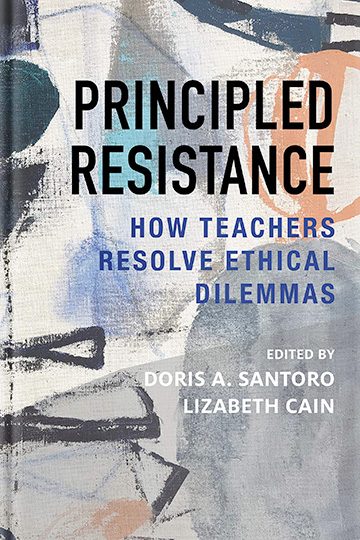
- Publisher: Harvard Education Press
- ISBN: 978-1-68253-228-7
- Published: September 1, 2018
Edited by Doris A. Santoro and Lizabeth Cain
Principled Resistance: How Teachers Resolve Ethical Dilemmas brings together senior scholars and activist teachers to explore the concept of resistance as a necessary response to mandates that conflict with their understanding of quality teaching. The book provides vivid examples of the pedagogical, professional, and democratic principles undergirding resistance, as well as the distinct perspective of each of its contributors: teachers who reflect on their acts of principled resistance; teacher educators who study teachers and support their professional growth; and historians who demonstrate that a tradition of teachers’ principled resistance has had a significant impact on American society, not only on schools and teaching. They also show the steps teachers take, in their reasoning and in their actions, to resist policies and mandates they are expected to enact.
This volume offers a critical and unique resource for teacher educators who are preparing prospective teachers to navigate the contentious terrain of education politics, teachers who are interested in leading change, and others interested in educational ethics.
Reviews
Doris Santoro and Lizabeth Cain have curated a thought-provoking volume, bringing together experts who provide the context needed to understand teachers’ resistance to a school reform regime that has long neglected to take their expertise and professionalism into account. Principled Resistance highlights the disciplines of philosophy and history to help us see teacher activism as an intelligent and ethical response to unjust conditions. This book is relevant for all of us who want public schools to be equitable, democratic spaces for teachers and students alike.
— Michele S. Moses, professor and associate vice provost, University of Colorado Boulder
Principled Resistance offers a provocative examination of how teachers have enacted pedagogical, professional, and democratic principles in pushing back against education practices and policies that they believe harm students, schools, and society. Educators will be inspired by the richly described examples in these chapters, and pushed to reflect on their own ethical responsibilities in a challenging but essential profession.
— Meira Levinson, professor of education, Harvard Graduate School of Educationf